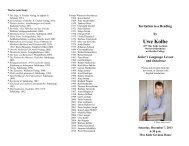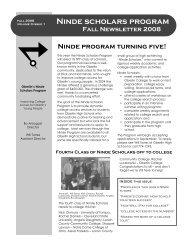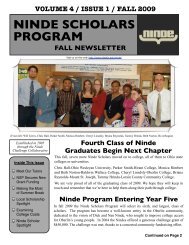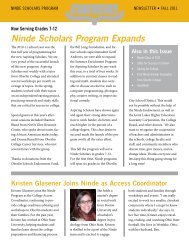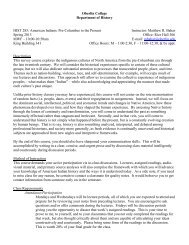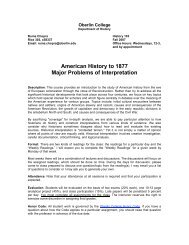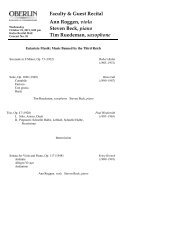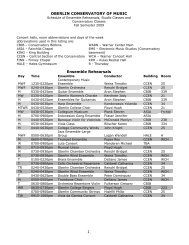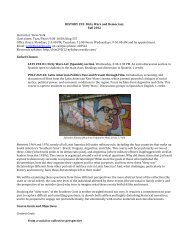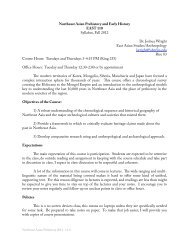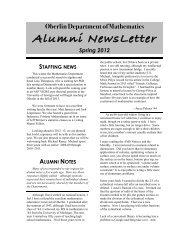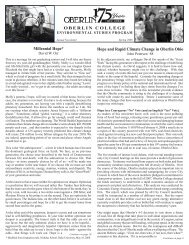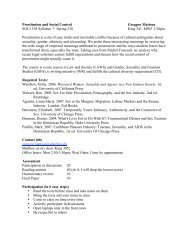Spring 2014 Cinema Studies Courses 1 - Oberlin College
Spring 2014 Cinema Studies Courses 1 - Oberlin College
Spring 2014 Cinema Studies Courses 1 - Oberlin College
You also want an ePaper? Increase the reach of your titles
YUMPU automatically turns print PDFs into web optimized ePapers that Google loves.
<strong>Spring</strong> <strong>2014</strong> <strong>Cinema</strong> <strong>Studies</strong> <strong>Courses</strong><br />
GENERAL INTEREST COURSES<br />
These courses are intended mainly for students not planning to major in <strong>Cinema</strong> <strong>Studies</strong>. Although they will<br />
not replace other required courses, they can serve as entry into some Advanced <strong>Courses</strong> (see Advanced<br />
<strong>Courses</strong> course descriptions for details). CINE 111 may count towards the major as an elective.<br />
Prerequisites: None; some spaces are reserved for first- and second-year students.<br />
111 (15610) What is Media? 4 Credits / 4HU<br />
TuTh 3:00-4:15 + Sun 4-7 + Tu 7-10 pm, B. Hilsabeck<br />
This course interrogates the origins, transformation, and effects of media on the individual and social<br />
levels. Exploring a wide range of technological means for recording, transmission, and visual display<br />
from the written word to IMAX, we will survey various approaches to the study of technology and mass<br />
communication. We will primarily focus on media theories and cultural studies scholarship, as well as on<br />
works of contemporary critics who question the possible futures of communication media. Enrollment<br />
Limit: 30.<br />
INTRODUCTORY CORE COURSES<br />
CINE 290 - Introduction to the Study of <strong>Cinema</strong> is required for all <strong>Cinema</strong> <strong>Studies</strong> majors and is a prerequisite<br />
for all advanced courses in the major (for those who declared before July 2009, CINE 299 - Persistence of<br />
Vision, fulfills this requirement). CINE 290 should be taken as early as possible -- 1) by the end of the<br />
sophomore year, 2) before declaring the major, and 3) before studying abroad/away. CINE 290 may not<br />
be taken in either of the final two semesters at <strong>Oberlin</strong> and still count toward the major.<br />
Prerequisties: None<br />
290 (16038). Introduction to the Study of <strong>Cinema</strong> 4 Credits / 4HU, W-Int<br />
MWF 2:30-3:20 + Sun 1-4 + Tu 7-10 pm, W.P. Day<br />
This course teaches students to engage critically with cinema. They examine elements of film form,<br />
style, and technique and explore how these produce meaning. Through theoretical and critical<br />
readings they consider cinema as art, industry, technology, and politics. They study approaches to<br />
watching and assessing movies, concepts and contexts in cinema studies as a discipline, and film in<br />
relation to other media. And they pay special attention to writing about cinema. Enrollment limit: 20.<br />
CINEMATIC TRADITIONS COURSES<br />
<strong>Cinema</strong>tic Traditions <strong>Courses</strong> count as electives towards the major. They include any 200-level course<br />
taught by <strong>Cinema</strong> <strong>Studies</strong> faculty exclusive of CINE 298 and CINE 299. They also include cross-referenced<br />
courses from other departments in the <strong>College</strong> and Conservatory (see the heading, “Cross-Referenced<br />
<strong>Courses</strong>” below).<br />
Prerequisites: One of CINE 110, CINE 111, or CINE 298 is strongly recommended as preparation for <strong>Cinema</strong>tic<br />
Traditions <strong>Courses</strong>. Unless otherwise noted, <strong>Cinema</strong>tic Traditions <strong>Courses</strong> are open to students who have<br />
completed any Writing Intensive (WRi) course or have gained Writing Certification (WR) in any course in the<br />
Humanities. They are also open to those who have achieved a 5 on the AP exam in English<br />
Language/Composition or English Literature/Composition; or a score of 710 or better on the SAT II writing test;<br />
or a score of 6 or 7 on the International Baccalaureate (IB). Other students may be admitted by consent of<br />
the instructor, with the understanding that students should be able to demonstrate the ability to handle<br />
writing, discussion, and analysis in ways typically taught in Writing Intensive classes.<br />
11/11/13 1
<strong>Spring</strong> <strong>2014</strong> <strong>Cinema</strong> <strong>Studies</strong> <strong>Courses</strong><br />
242 (17315) Masters of World <strong>Cinema</strong>: Focus On Bergman 2 Credits / 2HU<br />
MW 3:30-4:20 + Th 7-10 pm, D. Goulding<br />
First Module. A selected viewing and close analysis of Ingmar Bergman's most acclaimed films from his<br />
earlier comedies to his epic Fanny and Alexander. The evolution of Bergman’s central thematic<br />
concerns and the development of his distinctive cinematic style is traced out in Smiles of a Summer<br />
Night, The Seventh Seal, Wild Strawberries, Through a Glass Darkly, Winter Light, The Silence, Persona,<br />
and Fanny and Alexander. This course has no prerequisites. Enrollment Limit: 40.<br />
243 (17316) Masters of World <strong>Cinema</strong>: Focus On Polanski 2 Credits / 2HU<br />
MW 3:30-4:20 + Th 7-10 pm, D. Goulding<br />
Second Module. A focused discussion and critical analysis of Polanski's most significant films from his<br />
earliest works in his native Poland, his British, Hollywood, and French periods, to his recent awardwinning<br />
international co-productions Death and the Maiden and The Pianist. Emphasis will be placed<br />
on continuities and discontinuities of artistic influences, thematic treatment, sociocultural content, and<br />
aesthetic form and imagery as Polanski moved from the political East to the political West and from<br />
one film culture to another. This course has no prerequisites. Enrollment Limit: 40.<br />
PRODUCTION COURSES<br />
Production <strong>Courses</strong> are not required for graduation in the major. Students who wish to pursue production<br />
must begin with CINE 298 - Video Production Workshop I, which is the prerequisite for all advanced<br />
production courses (see Advanced <strong>Courses</strong> below for listings of advanced Production <strong>Courses</strong>). Students<br />
may take no more than one production course in a given semester at <strong>Oberlin</strong> (students in the Prague, Tisch,<br />
or other production programs are exempt). Production courses are selective and enroll during the first week<br />
of classes; interested students should consult with advisors and/or course instructors prior to applying for<br />
admission.<br />
Prerequisite: CINE 290 or CINE 299 and consent of instructor.<br />
298 (16028). Video Production Workshop I 4 Credits / 4HU<br />
W 1:30-4:30 + Sun W 7-10 pm, G. Pingree<br />
This course introduces students to the practical relationships among form, style and meaning in cinema<br />
through hands-on experience with the medium's technical elements. Students will not only read about<br />
cinema but design, compose, and edit their own sequences using sound and image. Consent of<br />
instructor required by electronic application. Enrollment Limit: 10.<br />
APOLLO OUTREACH INITIATIVE WORKSHOP<br />
This media literacy outreach course, geared for students who are interested in learning through teaching<br />
and community involvement, is specially designed to prepare majors to participate in the Apollo Outreach<br />
Initiative (AOI). Students may use two (2) full semesters of CINE 394 AOI Workshop to count as one (1) full<br />
300-level elective towards the major.<br />
N.B. Students who are taking CINE 394 for the first time MUST register for it as the FULL course, CINE 394F. Only<br />
students who are repeating the course may register for the HALF course, CINE 394H.<br />
394F/H (17506/17505) AOI Workshop<br />
2 Credits / 2HU<br />
F 1:30-4:30 + Th 7-10 pm, R. Brown-Orso, C. Orso<br />
Surrounded by computers, video games, and cell phones, children often have little chance to use<br />
media to express themselves or connect with their communities. Today's kids are tomorrow's<br />
storytellers, and to become responsible citizens in a digital age they need tools to communicate<br />
11/11/13 2
<strong>Spring</strong> <strong>2014</strong> <strong>Cinema</strong> <strong>Studies</strong> <strong>Courses</strong><br />
through text, image, and sound. We'll explore community outreach models and media education<br />
projects, lead a video poetry residency at Langston Middle School, and prepare the Apollo Outreach<br />
Initiative's Summer Media Workshop. Enrollment limit: 20.<br />
ADVANCED COURSES<br />
Advanced <strong>Courses</strong> are classes taught by <strong>Cinema</strong> <strong>Studies</strong> faculty at the 300 level. Majors must take at least<br />
three Advanced <strong>Courses</strong> to graduate; at least one of these must be completed before the senior year, and<br />
at least one must be in critical studies (not a Production Course). Most Advanced <strong>Courses</strong> require consent of<br />
the instructor.<br />
Prerequisites for Advanced <strong>Courses</strong>: CINE 110 or CINE 111 and a <strong>Cinema</strong>tic Traditions Course; OR CINE 290 or<br />
CINE 299; OR consent of instructor.<br />
Prerequisites for Advanced <strong>Courses</strong> that are also Production <strong>Courses</strong>: CINE 290, CINE 298, and consent of<br />
instructor.<br />
311 (17644) Silent <strong>Cinema</strong>: Technology, Industry, Modernity 4 Credits / 4HU<br />
Tu 7:00-9:30 pm + Sun 1-4 + Th 7-10 pm, B. Hilsabeck<br />
The thirty years between the cinema’s invention in the 1890s and the institution of synchronized sound<br />
in the late 1920s constitute a dynamic and contested era of film history. This course will seek to<br />
understand the silent cinema from a variety of perspectives, including the cinema as a representative<br />
technology of modernity, the formation of the cinema as industry and cultural institution, and the<br />
relationship between the cinema and other media. Enrollment limit: 20.<br />
322 (16029) Video Production II: Experimental Short Film 4 Credits / 4HUTh 1:30-4:30<br />
TuTh 10:00-noon (Mudd 443) + W 7-10 pm (Mudd 443), R. Brown-Orso<br />
This is a hands-on advanced media production course that aims to activate and amplify students'<br />
creativity, and to stir passion for time-based media that transcend mainstream conventions. Students<br />
will be introduced to both 16mm film and advanced HD video production techniques and postproduction<br />
strategies. We will screen a wide range of works by independent film directors and artists<br />
and will examine closely cinematic strategies and experimental approaches to the medium that span<br />
from early cinema to present day. Each student will create a fully realized short film ready for film<br />
festivals or exhibition. Consent of instructor required by electronic application. Enrollment limit: 12.<br />
325 (17317). Imagining Immanence 4 Credits/ 4HU, W-Int<br />
TuTh 1:30-2:45 + Sun 4-7 + W 7-10 pm, J. Pence<br />
From the vantage point of a seemingly triumphant scientific modernism, Freud declared religion's fate<br />
to be "the future of an illusion." How, then, do we make sense of the persistence and flourishing of<br />
theological concerns in contemporary culture? In exploring this complex question, we will focus on<br />
works of literature and cinema (perhaps other arts) that explore questions of meaning in broad, deep<br />
and specific terms. Identical to ENGL 322 (17222). Prequisites: CINE 110 or CINE 111 and a <strong>Cinema</strong>tic<br />
Traditions Course, OR CINE 290 or CINE 299. Also acceptable: prerequisites as presented in the English<br />
Program section titled ‘Advanced <strong>Courses</strong>.’ Enrollment limit: 25. This course may also count for the<br />
major in CMPL.<br />
335 (16030) Screenwriting Workshop 4 Credits / 4HU, W-Adv<br />
Tu 1:30-4:30 + Sun 4-7 + M 7-10 pm, G. Pingree<br />
Students will explore the screenwriting process through critical examination of existing films and scripts<br />
and through the creation of their own screenplays. Consent of instructor required. Prerequisites: CINE<br />
290 or CINE 299, instructor consent, a completed application and writing sample. Consent of instructor<br />
required by electronic application. Enrollment limit: 12.<br />
353 (17318). <strong>Cinema</strong> and May ’68 4 Credits / 4HU, CD<br />
11/11/13 3
<strong>Spring</strong> <strong>2014</strong> <strong>Cinema</strong> <strong>Studies</strong> <strong>Courses</strong><br />
TuTh 9:30-10:50 + M 7:00-10:30 pm, G. An<br />
This course, where history and media history inflect each other, will examine narrative, documentary,<br />
and experimental films that grappled with artistic, political, and ideological upheaval of May 1968, a<br />
year that “rocked the world.” We will focus on French cinema but also explore the role of television<br />
and filmmaking from other continents. What is ultimately at stake is the viability of “political cinema”<br />
and other forms of commitment. Conducted in English. Identical to FREN 420 (16967). Prerequisite:<br />
CINE 299 or CINE 290, FREN/CINE 250. Consent of instructor required. Enrollment limit: 20.<br />
375 (17319). Realism, 1800 to the Present: The Mirror Up to Nature 4 Credits /4HU, W-Adv<br />
MWF 11:00-11:50 + Sun 7-10 pm, W.P. Day<br />
Realism, though not the radical project it was, remains a significant part of contemporary culture. The<br />
tension between accurate reproduction of "reality" and the creation of meaningful aesthetic form<br />
gives Realism its dynamic quality. Realism negotiates between the possibilities and limitations of<br />
representation in media such as the novel, drama, painting, photography, cinema, and television. The<br />
course will explore what realism was and its legacy, drawing from American, British, Irish, French, Italian,<br />
and Russian traditions. Diversity, 1700-1900 OR Post-1900 (not both). Identical to ENGL 375 (17226) and<br />
CMPL 376 (17312). Enrollment Limit: 25.<br />
PRIVATE READINGS<br />
Private Readings are available to those who have completed introductory coursework in the Program. Students<br />
seeking to arrange Private Readings should contact professors directly.<br />
995. Private Reading 2-4 Credits / 2-4HU<br />
Consent of instructor required. Signed Private Reading card must be submitted to the Registrar's Office.<br />
-01F/H (16847/16840): G. An<br />
-05F/H (16851/16844): J. Pence<br />
-02F/H (16848/16841): R. Brown-Orso<br />
-06F/H (16852/16845): G. Pingree<br />
-04F/H (16850/16843): W.P. Day<br />
-07F/H (16853/16846): Staff<br />
CROSS-REFERENCED ELECTIVE COURSES<br />
These courses count towards the <strong>Cinema</strong> <strong>Studies</strong> major as elective <strong>Cinema</strong>tic Traditions <strong>Courses</strong>. Students<br />
should register for them using the number in the department or program of origin. For course<br />
descriptions and prerequisites, please find the relevant department or program in this catalog.<br />
RUSS 225 Russian <strong>Cinema</strong> Today: Films for a New Generation 4HU, CD<br />
TuTh 3:00-4:15, M. Blasing<br />
An exploration of key themes in Russian cinema since the collapse of the Soviet Union. We will discuss<br />
how films by both emerging and well established directors (ranging from comic to tragic, and from arthouse<br />
films to Hollywood-style blockbusters) reflect the shifting political and social landscapes of post-<br />
Soviet Russia and engage questions of intergenerational conflict, definitions of masculinity and<br />
motherhood, and the politics of identity. No knowledge of Russian required. Enrollment Limit: 25.<br />
11/11/13 4



